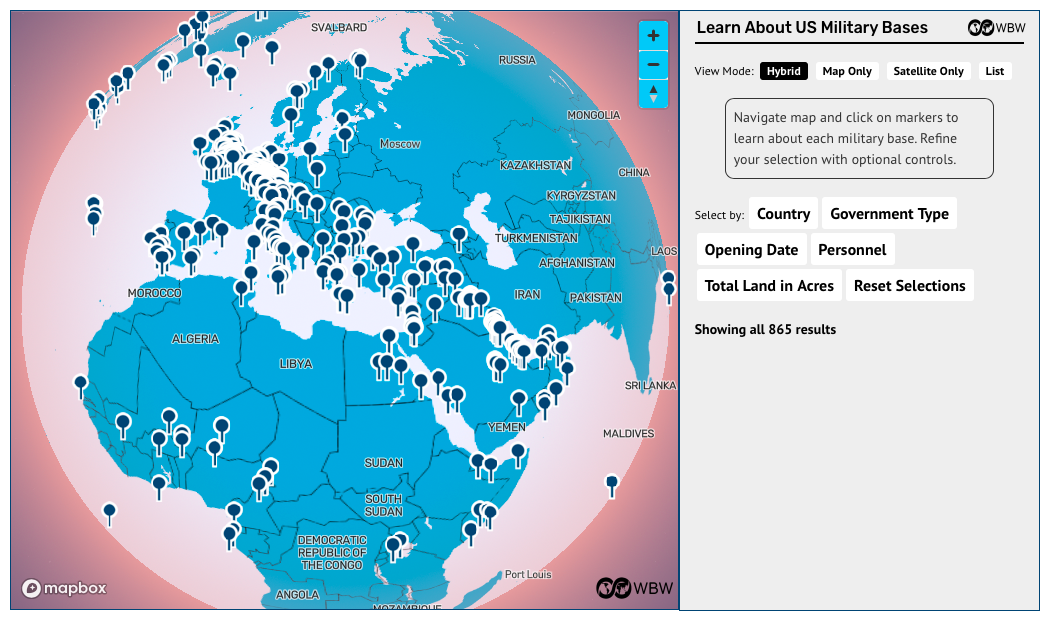
A new online database is a critical resource for challenging the war machine.
Mapping All US Military Bases,
In Hopes of Closing Them
Kathy Kelly / The Progressive
(May 4, 2023) — On the few occasions when a government moves toward converting property or weapons production facilities into something useful, I can’t help but think, “What if this signals a trend, what if practical problem-solving begins to replace reckless war preparation?”
A new online database produced by the peace organization World BEYOND War is an important step in that direction.
When Spain’s President Pedro Sánchez announced on April 26 that his government will build 20,000 homes for social housing on land owned by the country’s Ministry of Defense, I immediately thought about crowded refugee camps around the world and the inhumane treatment of people without homes. Just visualize the vast capacity to welcome people into decent housing and promising futures if space, energy, ingenuity, and funds were diverted from the Pentagon to meet human needs.
We need to be imaginative about the worldwide potential for accomplishing good results by choosing the works of mercy over the works of war. Why not brainstorm about how resources devoted to military goals of domination and destruction could be used, instead, to defend people against the greatest threats we all face—the looming terror of ecological collapse, the ongoing potential for new pandemics, and the proliferation of nuclear weapons and threats to use them?
But a crucial first step entails fact-based public education about the global infrastructure of the US military empire. What is the cost of maintaining each military base? How much environmental damage does each base cause (consider depleted uranium poisoning, water contamination, noise pollution, and the risks of nuclear weapons storage)?
We also need analysis about ways these bases exacerbate the likelihood of war and prolong the vicious spirals of violence attendant with all wars. How does the US military justify its hundreds of overseas bases, and what are the human rights records of the governments with which the United States negotiated to build them?

World BEYOND War’s amazing online tool reveals Pentagon’s global reach.
Tom Englehardt of TomDispatch notes the paucity of discussion about the profusion of US military bases, some of which he calls MIA because the US military manipulates information and neglects to even name various forwarding operating bases. With very little oversight or discussion, Englehardt observes, the “massive (and massively expensive) base structure remains firmly in place.”
Thanks to the tenacious work of the researchers who formed its No Bases campaign, World BEYOND War now presents the many-faced hydra of US militarism, worldwide, in a visual database.
The project has plotted all of the US military bases around the globe onto an interactive map. Researchers, scholars, journalists, students, and activists—or any concerned member of the public—can click on any base indicated on the map and explore vital questions about their cost and impact. It’s a unique and challenging resource.
At the helm of the mapping project is Mohammad Abunahel.

On almost any given day in Abunahel’s busy life, he sets aside time to work on the mapping project. He and his wife are both Ph.D. students in Mysore, India. They share the care of their infant son, Munir. He takes care of the baby while she studies, and then they trade roles. For years, Abunahel has devoted skill and energy to the mapping database, which has quickly drawn the greatest number of “hits” of any section on the WBW website. He considers the map a step in addressing wider problems—helping people to grasp the intensifying toll of US militarism and providing information that is useful for taking action to close bases.
Abunahel has good reason to resist military dominance and the threats of destroying cities and towns with overwhelming weaponry. He grew up in Gaza. Throughout his young life, before he finally managed to obtain visas and scholarships to study in India, he experienced constant violence and deprivation.
As one of ten children in an impoverished family, he readily applied himself in classroom studies, hoping to improve his chances for a normal life. But along with the constant threats of Israeli military violence, Abunahel faced closed doors, dwindling options, and rising anger—his own and that of most other people he knew. He wanted out. Having lived through successive onslaughts by Israeli Occupation Forces—which killed and maimed hundreds of innocent people of Gaza since the early 2000s, including children, and destroyed homes, schools, roadways, electrical infrastructure, fisheries, and farms—Abunahel grew certain that no country has the right to destroy another.
He’s also adamant about our collective responsibility to question the justifications for the US network of military bases. Abunahel rejects the notion that these bases are necessary to protect the people of the United States. He sees clear patterns showing that the base network is being used to impose US national interests on people in other countries.
The threat is clear: if you do not submit yourselves to fulfill US national interests, the United States could eliminate you. And if you don’t believe this, look at other countries that have been surrounded by US bases. Consider Iraq, or Afghanistan.
David Swanson, executive director of World BEYOND War, reviewing David Vine’s book, The United States of War, notes that “since the 1950s, a US military presence has correlated with the US military starting conflicts. Vine modifies a line from Field of Dreams to refer not to a baseball field but to bases:
‘If you build them, wars will come.’ Vine also chronicles countless examples of wars begetting bases begetting wars begetting bases that not only beget yet more wars but also serve to justify the expense of more weapons and troops to fill the bases, while simultaneously producing blowback — all of which [build] momentum toward more wars.”
Illustrating the extent of the US network of military outposts deserves support. Calling attention to the WBW website and using it to help resist all wars are both vital ways to increase the potential for expanding and organizing resistance to US militarism. WBW also welcomes financial contributions to assist the work of raising awareness of warmaking and our resolve to build a world BEYOND war.
Kathy Kelly is board president of World BEYOND War. A previous version of this piece appeared on the WBW site.